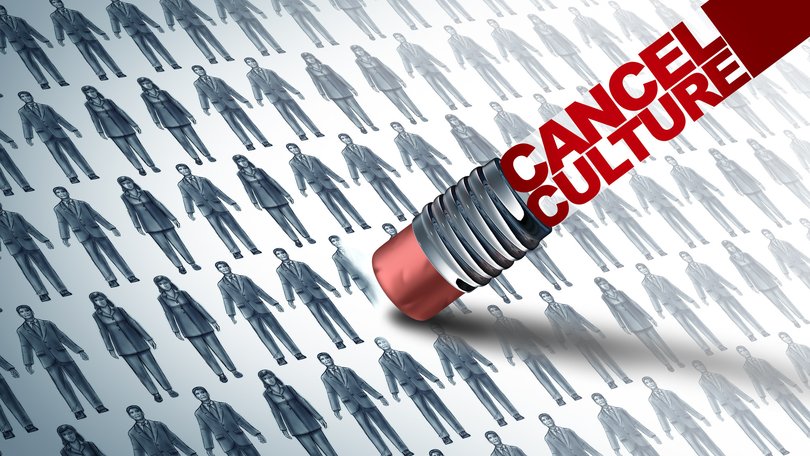THE NEW YORK TIMES: When did cancel culture become ‘consequence culture’?
THE NEW YORK TIMES: Although many pundits seem to have recently adopted the term, it is not new. And neither did conservatives invent it.

Instead of cancel culture, call it consequence culture.
At least, that’s what some Republican leaders and prominent conservatives are doing in the week since the assassination of political activist Charlie Kirk. Dozens of people have lost their jobs for making remarks about Kirk that are perceived as insensitive.
On Wednesday ABC suspended Jimmy Kimmel’s show over comments the late-night host made accusing “the MAGA gang” of trying to portray as a leftist the man who has been charged with Kirk’s murder.
Sign up to The Nightly's newsletters.
Get the first look at the digital newspaper, curated daily stories and breaking headlines delivered to your inbox.
By continuing you agree to our Terms and Privacy Policy.The pressure campaign being carried out by Kirk’s allies — and led by the White House, where Vice President JD Vance has encouraged Americans to report to employers anyone “celebrating” Kirk’s death — was known as “cancel culture” not long ago.
In the past several years, some conservatives weaponised that term to attack those on the political left for trying to professionally harm or socially ostracize those who made statements or took actions deemed unacceptable.
Now some Kimmel supporters and others are accusing the right of embracing the same “cancel culture” it once maligned. In response, some Trump supporters are reframing it as “consequence culture.”
“When a person says something that a ton of people find offensive, rude, dumb in real time and then that person is punished for it, that’s not cancel culture. That is consequences for your actions,” Dave Portnoy, the founder of Barstool Sports, wrote on social platform X on Wednesday.
In an email, Portnoy declined to elaborate on his comments.
The term has been gaining traction in conservative media, in a headline in National Review (“‘Consequence Culture’ Comes for the Angry Left”) and posts on X from conservative activists like Riley Gaines, who wrote Wednesday night: “Cancel culture? No. Consequence culture.”
Although many pundits seem to have recently adopted the term, it is not new. And neither did conservatives invent it.
“Consequence culture” began floating around in the late 2010s, when social media campaigns called for the firings and ostracism of cultural figures for insensitive or offensive statements.
When “cancel culture” entered the popular lexicon to describe these campaigns, many on the right rallied against it as their cause célèbre, citing the chilling of speech.
“The right made it their brand to talk about resisting being canceled,” said Meredith D. Clark, associate professor of race and political communication at the University of North Carolina’s Hussman School of Journalism and Media. “And I have to give it to them, they are masters of branding.”
In reaction, those attempting to punish offensive behaviour sought to distance themselves from what quickly became a loaded phrase.
“The term cancel culture is a bad faith fallacy,” actor Alex Winter of “Bill and Ted’s Excellent Adventure” wrote on Twitter in 2019, referring to men who lost their positions in the entertainment industry following accusations of sexual misconduct.
“There’s only consequence culture,” he added. “It’s long overdue, and most of the exposed predators have yet to face meaningful consequences.”
From there, the term trickled up to figures in the mainstream media.
In 2021, former Fox News host Lou Dobbs lost his show amid a defamation lawsuit that accused him of spreading conspiracies about a voting machine company in the aftermath of the 2020 presidential election.
“It is not cancel culture here,” Brian Stelter, then the host of CNN’s Reliable Sources, said at the time. “It is consequence culture. What are the consequences for riling up people with reckless lies about a democracy that most Americans cherish?”
Also in 2021, Sunny Hostin, a co-host of “The View,” made a similar distinction in reference to efforts by Republican politicians to distance themselves from the Jan. 6, 2021, insurrection.
“We hear so much from the right talking about cancel culture, cancel culture,” Hostin said on air. “What they don’t want is a culture of accountability. They don’t want a consequence culture.”
And this summer, actor George Takei, a prominent liberal voice, shared a story on Facebook about the firing of a man who had described himself as a “fascist” during a viral YouTube debate. The caption read: “Freedom of speech does not mean freedom from consequences.”
Freedom of speech is enshrined in the First Amendment, and those cheering on firings over speech are often quick to point out that their enthusiasm isn’t in conflict with a prized American liberty.
One key difference between “consequence culture” from the left and the right, some have argued, has to do with who is enforcing those consequences. Most of the people fired for their posts about Kirk’s murder have been sanctioned by private entities — which have every right to do so.
But Kimmel’s suspension appears to have resulted from pressure by the Federal Communications Commission, a government agency, and the First Amendment prohibits the government from restricting the speech rights of its citizens.
“That’s not cancel culture at all,” said Adrian Daub, a Stanford professor and the author of “The Cancel Culture Panic: How an American Obsession Went Global,” referring to Kimmel. “By what definition of cancel culture is using the levers of state to get a guy fired from his media job ‘cancel culture’? We don’t need the fancy neologism. We know what that is. It’s just an authoritarian crackdown.”
Whatever it is, Kirk’s supporters have a term for it, and it’s one they learned from their political enemies.
This article originally appeared in The New York Times.
© 2025 The New York Times Company
Originally published on The New York Times
